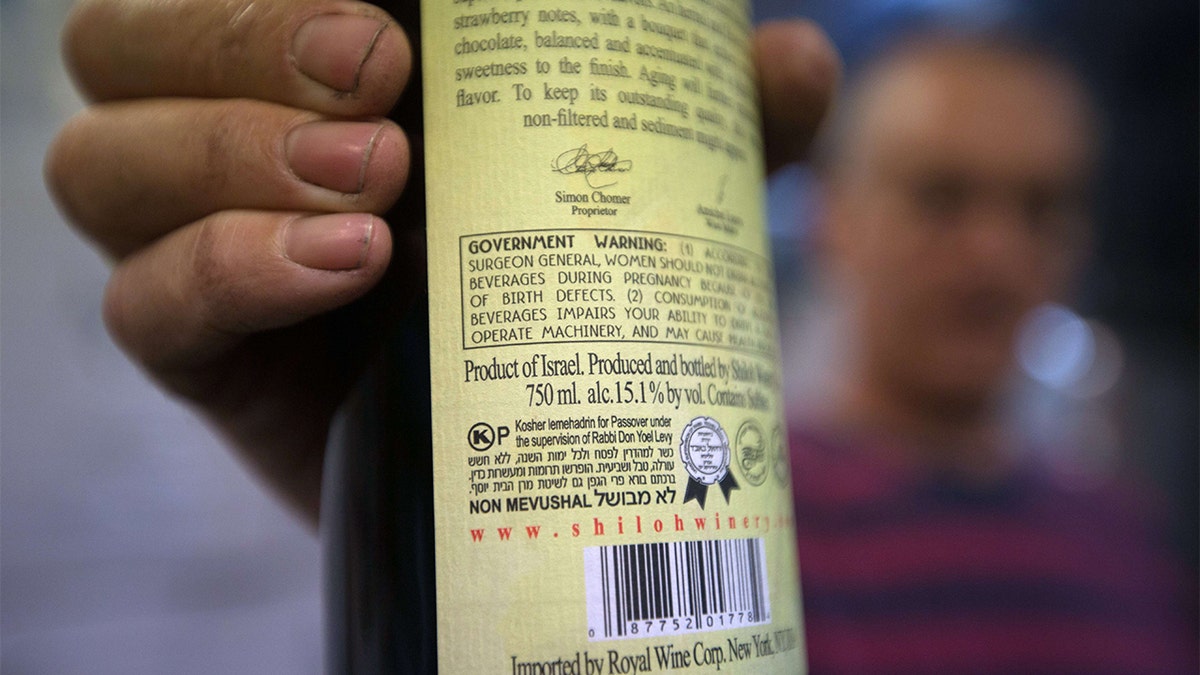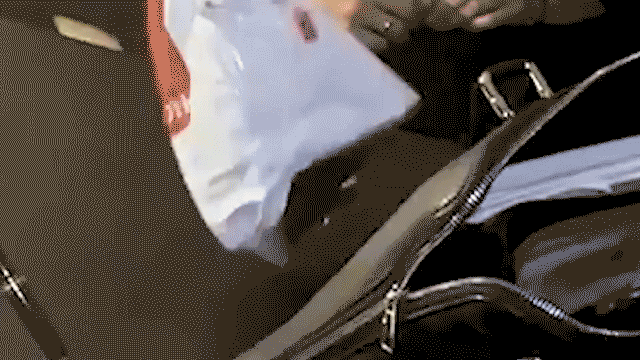Fox News Flash top headlines for Nov. 12
Fox News Flash top headlines for Nov. 12 are here. Check out what's clicking on Foxnews.com
Israeli officials are blasting the European Union’s announcement that goods from Jewish settlements in the country must be specifically labelled, with Israel’s ambassador to the United Nations saying, “Anti-Semitism in Europe now has legal cover.”
The European Union's top court ruled Tuesday that EU countries must identify products made in Israeli settlements on their labels. The ruling pertains to products imported from settlements in the occupied West Bank, East Jerusalem and Golan Heights, all captured by Israel in the 1967 Six-Day War. The Palestinians claim the West Bank and east Jerusalem as parts of a future state, a position that has global support.
The European Court of Justice said that when products come from those territories, their labels must provide an "indication of that provenance" so that consumers can make "informed choices" when they shop.

Amichai Luria presents a bottle of his wine, used mainly for export, at the Shilo winery in the Jewish settlement of Shilo in the occupied West Bank on November 12, 2015. The European Union announced that goods from settlements -- Jewish communities built in areas occupied by force in 1967 -- must be specifically labelled, infuriating Israel. The EU ruling affects products imported from settlements in the occupied West Bank, east Jerusalem and Golan Heights, all taken by Israel in the 1967 Six-Day War. (MENAHEM KAHANA/AFP via Getty Images)
The EU insists that any product made in the settlements must not carry the generic "Made in Israel" tag and wants them to be easily identifiable to shoppers.
COEXISTENCE IN A 'DANGER' ZONE: AN INSIDE LOOK AT ISRAELI SETTLEMENTS IN THE WEST BANK
The EU rejects Israeli settlement expansion, saying it undermines the hopes for a two-state solution. Nearly 700,000 Israelis currently live in the West Bank and east Jerusalem, which is almost 10 percent of the country's Jewish population.
Israel said the labeling is unfair and discriminatory, adding that other countries involved in disputes over land are not similarly sanctioned.
Danny Danon, Israel’s ambassador to the U.N., attacked the decision of the European Court of Justice to require separate labeling of Israeli products made in Judea, Samaria and Golan Heights.
“This is another example of Europe continuing its surrender to Israel's enemies. The EU’s discrimination against the Zionist enterprise will provide legal cover for anti-Semitism,” Danon said on Tuesday. “The court’s decision will only spread this ancient bigotry across the continent, providing extra fuel for the forces trying to undermine and damage the Jewish State. Today marks a dark stain of Europe’s own doing that will never wash away.”

Danny Danon, Israel’s ambassador to the U.N., attacked the decision of the European Court of Justice to require separate labeling of Israeli products made in Judea, Samaria and Golan Heights. (EuropaNewswire/Gado/Getty Images)
The European Court of Justice stressed that settlements "give concrete expression to a policy of population transfer conducted by that State outside its territory, in violation of the rules of general international humanitarian law."
It said any failure to identify the point of origin meant that "consumers have no way of knowing, in the absence of any information capable of enlightening them in that respect, that a foodstuff comes from a locality or a set of localities constituting a settlement established in one of those territories in breach of the rules of international humanitarian law."
MORE THAN 200 ROCKETS FIRED INTO ISRAEL FROM GAZA AFTER ISLAMIC JIHAD LEADER KILLED
It is not entirely clear how the ruling will be enforced since the real origin of the product is not always easy to identify, according to experts.
The European Commission said the origin of settlement produce must be made known in a way that is "not misleading to the consumer," adding that it's up to individual EU countries to make sure that labels are accurate.
Human Rights Watch did not immediately respond to Fox News’ request for comment. However, according to The Associated Press, the watchdog's EU Director, Lotte Leicht, said it's "an important step toward EU member states upholding their duty not to participate in the fiction that illegal settlements are part of Israel."
Israel opposed the ruling, warning that it supports the Boycott, Divestment and Sanctions (BDS) movement, The Jerusalem Post reported.
Israel's Foreign Ministry rejected the ruling, reportedly saying it set a "double standard" that unfairly singles out Israel when there are dozens of territorial disputes around the world.
"The European Court of Justice's ruling is unacceptable both morally and in principle," Foreign Minister Israel Katz said. "I intend to work with European foreign ministers to prevent the implementation of this gravely flawed policy."
The former Minister of Justice of Israel, Ayelet Shaked, tweeted on Tuesday writing that the ruling has a “stench of anti-Semitism.”
She added that there is no similar marking directive on other conflict zones including Tibet, Cyprus, others.
AIRBNB REMOVES ISRAELI WEST BANK LISTINGS, SPARKING OUTCRY
“There is no justice in the European Court of Justice,” Shaked wrote.
Palestine Liberation Organization official Saeb Erekat and Palestinian Authority Foreign Minister Riyad Malki welcomed the ruling, but said it did not go far enough, according to the Jerusalem Post.
“Our demand is not only for the correct labeling reflecting the certificate of origin of products coming from illegal colonial settlements, but for the banning of those products from international markets,” Erekat reportedly said.
Eugene Kontorovich, a professor at George Mason University’s school of law and the head of its Center for International Law in the Middle East, told Fox News on Tuesday, “Now Jewish products are the only ones to have to bear special labels based on their origin. This is a new kind of yellow star put exclusively on Jewish goods,” referring to the badge Jews throughout Nazi-occupied Europe were forced to wear as a means of identification.
Kontorovich said the ruling “also shows it’s not about the Palestinians, it’s about the Jews. Because in the Golan Heights where there are no Palestinians and no discussion of a Palestinian state, the Europeans imposed the same rule.”
“And we know it’s not about occupation because they don’t apply this rule in any occupied territory anywhere in the world or anywhere,” he added.
Israel Ganz, the head of the local settler council, said the ruling is part of "a double standard that discriminates against Jews living and working in their homeland of thousands of years. This decision will directly hurt the Arab population working at these factories, and manufacturing these products."
He added that he did not expect sales to be affected as settlement products are of "high standards."
The volume of settlement goods coming into Europe, which includes olive oil, fruit, wine and industrial products, is estimated to affect about 1 percent of imports from Israel, which amount to about $16.5 billion a year.
The Delegation of the European Union to the United States and the Delegation of the European Union to the United Nations did not immediately respond to Fox News’ request for comment.
EU Commission Spokeswoman Mina Andreeva pointed out that Israel has a special trading relationship with the EU, with products originating in its internationally recognized borders benefiting from preferential tariff treatment, the Associated Press reported.
"This situation will remain unchanged," she said. "The EU does not support any form of boycott or sanctions against Israel."
CLICK HERE TO GET THE FOX NEWS APP
Doing business in or with the Israeli settlements has been an issue for some companies, including Airbnb, in the past. Last year, Airbnb stopped listings there, then reversed its decision.
The Associated Press contributed to this report









































